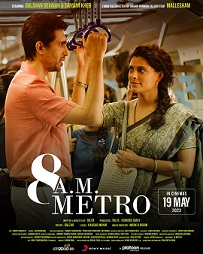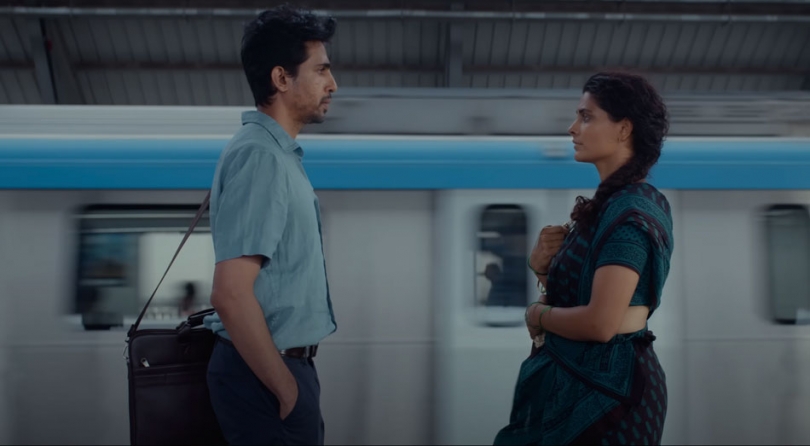|
|
||
|
Pro Tools
FILMFESTIVALS | 24/7 world wide coverageWelcome ! Enjoy the best of both worlds: Film & Festival News, exploring the best of the film festivals community. Launched in 1995, relentlessly connecting films to festivals, documenting and promoting festivals worldwide. Working on an upgrade soon. For collaboration, editorial contributions, or publicity, please send us an email here. User login |
8 am Metro, Review: One train, many tracks
8 am Metro, Review: One train, many tracks Firstly, it is not about a train. Secondly, the journey of the lead characters changes so many tracks that it ultimately derails, and it takes a long-drawn climax to get it back on track. Even then, it ends on half a track. And yet there is something about 8 am Metro that is endearing and fresh. Coming not too long after Pierre Filmon’s French film, In Between Two Trains/Long Time No See (2019), it is likely to have been inspired by the French film. That film too, like 8 am Metro, is about a couple and their rendezvous at a train station. The other obvious recall would be Brief Encounter (1945). At least one track is common to the two films, the French and 8 am Metro, as I recap. But 8 am Metro has so many tracks, that it appears to be inspired by not one but several films, or has been or over-written by its writers. It is a deeply poetic, sad film that has only moments of humour. In an era of mass killing, punctuated only by item songs, it offers a refreshing change. That the change is not enough to carry the film through is unfortunate. Iravati, a Maharashtrian mother of a girl and a boy, leads a routine life with her husband, Umesh, an executive. One day, she gets a call that her sister, Riya, who is in Hyderabad, is pregnant and there is nobody to stay by her. Their parents are no more and Riya’s husband has gone to the USA. Though Riya lives a considerable distance away, she decides to stay by Riya in her hours of need. A train journey is the fastest way to get to the hospital where Riya is admitted, but Iravati is terrified of travelling by train, due to an incident in her childhood, which left a deep scar. But travel by any other means is both costly and time consuming. Finally, she musters up enough courage to take the metro. At the last minute, on the platform, however, she gets a panic attack. A stranger gives her support and offers her water to drink. It is a great coincidence that she meets the stranger – his name is Preetam - again, on the way back. Both Iravati and Preetam take the 8 am Metro on the way to their destination, every day, and the 6 pm Metro to go back home, every evening. A platonic friendship develops between the two. Preetam is well-read, and shares rare bits of knowledge with her. Iravati is a closet poet, an art she inherited from her father, and she narrates her work to him. A lot of it is in prose. She says she misses good filter coffee, and he finds a place that serves excellent filter coffee, though he is not a filter coffee drinker. She tells him about her family, about her husband Umesh, who is also Maharashtrian, and he tells her about his wife, a Bengali, and two children. Soon, Riya will give birth, and Iravati and Preetam will not see each other again. The ‘star-crossed lovers’ have come as close as possible, without getting physical. Iravati has even visited Preetam’s house, with him, when they were alone. Unable to restrain herself at the thought of permanent parting, Iravati decides to visit Preetam one last time. What you have just read is a linear development of the plot, and it could be seen as such, had it not been complex. There is a full track of Riya and her husband. Preetam’s patronising of a particular book shop for no logical reason leaves you wondering why. What prompted him to collect and read the works, and collect portraits, of classic authors and poets, both Indian and foreign, is never explained. How are the two ‘strangers on a train’, both emotionally vulnerable, able to curb their emotions, not letting them get physical, is a conundrum. Writers Shruti Bhatnagar (43, writer of Mallesham, 2019) and Raj Rachakonda (IT Programmer, based in the US; made his debut Tamil film in 2008; award-winning Telugu film, Mallesham) have to answer these questions. Since Raj Rachakonda is the director too, it is he who has decided to employ a story-telling technique that believes in concealing facts from the audience because you want to conceal them from a character/characters. This leads to a situation where essential elements of the narrative emerge suddenly, towards the end. The audience feels cheated, because their universe is confined to what is narrated on screen, and a crucial scene or factor should not be sprung as a surprise or flashback, just before the end. And the end itself goes on and on. There are several things going for the film. Emotions are understated, there is a generous use of Gulzar’s poetry (it took the good offices of Anurag Kashyap and a year in waiting to get this association cemented), a strong case made for the dying habit of reading books in print, many references to civilisations and societal norms or mores, actors who look their parts, scenes that are variable - rather long or extremely short, as dictated by content, very realistic capturing of stations, trains and compartments (bogies), to the extent that it appears a promo for the Metro. But there are things that do not go well within the frame-work of the story. Some of these are listed above, where I have talked about the film’s writing. There are more, like the conflict between Riya and her husband, the extra-marital affair of Riya’s friend’s husband, the confined space that is book-shop and all the scenes there, the too cute conversations between Riya and her children, mainly on the phone, the inability of the lead actors to pronounce the Urdu words in Gulzar’s poetry, and more.
Performances are uniformly good. Kambeyanda Devaiah Gulshan, or Gulshan Devaiah, who studied Fashion Design and taught the subject for ten years, before making his debut in the 2010 That Girl in Yellow Boots, a forgettable Anurag Kashyap film, breathes life into Preetam. Gulshan is a very rare name down south. Although his Hindustani is not perfect, one must remember that he is Kannadiga whose mother tongue is not even Kannada but a dialect. At 45, he suits the part well. But one wonders why the director chose the actor, whose last few outings were Badhaai Do (2022), Blurr (2022), Shiksha Mandal (2022) and Duranga (2022), a Hindi adaptation of the Korean drama, Flower of Evil (2020). He has said to the press that no Telugu actor wanted to do this film. It would be interesting to know why did he want a Telugu actor and why did none of them agree to do this role. Perhaps because there is neither action nor comedy in it. Saiyami Kher is remarkably restrained as Iravati. Kher is a surname found in Kashmir and Maharashtra. She has large, expressive eyes. Mumbai-born, 31 year-old Saiyami has appeared in Mirza's Lady (2016), Choked (2020) and Special OPS (2020). Acting is in her blood, as she is the grand-daughter of yesteryear’s heroine, Usha Kiran. Unfortunately, the voice over in Hindustani is often faulty, and like a drawl. The fleeting moment, when there is physical contact between the two lead players, and the only time they argue, have been enacted wonderfully by both. Umesh Kamat as Umesh is natural in a brief role. Kalpika Ganesh is captivating, playing Mridula. Nimisha Nair as Riya gets a meaty part, but she has to be on a hospital bed all the time. Rajiv Kumar Aneja is passable as the writer, not looking down and out as he is supposed to be. Rest of the listed cast reads: Dheer Charan Srivastav, Jay Jha, Kajol Dubey, Moin Jaan and Madhu Swaminath. Music by Mark K. Robin, Lyrics by Kausar Munir, and Cinematography by Sunny Kurapati are standard quality. Film Editing by Anil Aalayam is variable, with some scenes rather long and some shots too short to register. It will remain a mystery why did the director choose to make a film with such a strong Hindustani literary flavour, with actors whose first language is not Hindi. If you dig off-beat subjects that are full of melancholia and almost devoid of humour, this could yet be your cup of filter coffee. One must laud the attempt at making something off the beaten track, though the possibilities were, to an extent, frittered away. Rating: ** ½ Trailer: https://youtu.be/Sf6l492kclQ 18.05.2023 | Siraj Syed's blog Cat. : Anil Aalayam Anurag Kashyap Brief Encounter Dheer Charan Srivastav Gulzar In Between Two Trains Jay Jha Kajol Dubey Kalpika Ganesh Kambeyanda Devaiah Gulshan Kausar Munir Long Time No See Madhu Swaminath Moin Jaan Nimisha Nair Pierre Filmon Rajiv Kumar Aneja Saiyami Kher Sunny Kurapati Umesh Kamat Usha Kiran Independent FILM
|
LinksThe Bulletin Board > The Bulletin Board Blog Following News Interview with EFM (Berlin) Director
Interview with IFTA Chairman (AFM)
Interview with Cannes Marche du Film Director
Filmfestivals.com dailies live coverage from > Live from India
Useful links for the indies: > Big files transfer
+ SUBSCRIBE to the weekly Newsletter Deals+ Special offers and discounts from filmfestivals.com Selected fun offers
> Bonus Casino
User imagesAbout Siraj Syed Syed Siraj Syed Siraj (Siraj Associates) Siraj Syed is a film-critic since 1970 and a Former President of the Freelance Film Journalists' Combine of India.He is the India Correspondent of FilmFestivals.com and a member of FIPRESCI, the international Federation of Film Critics, Munich, GermanySiraj Syed has contributed over 1,015 articles on cinema, international film festivals, conventions, exhibitions, etc., most recently, at IFFI (Goa), MIFF (Mumbai), MFF/MAMI (Mumbai) and CommunicAsia (Singapore). He often edits film festival daily bulletins.He is also an actor and a dubbing artiste. Further, he has been teaching media, acting and dubbing at over 30 institutes in India and Singapore, since 1984.View my profile Send me a message The EditorUser contributions |





























